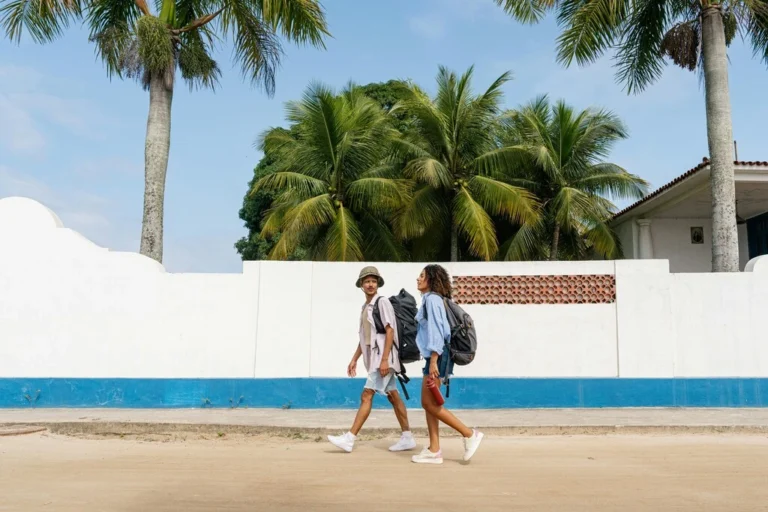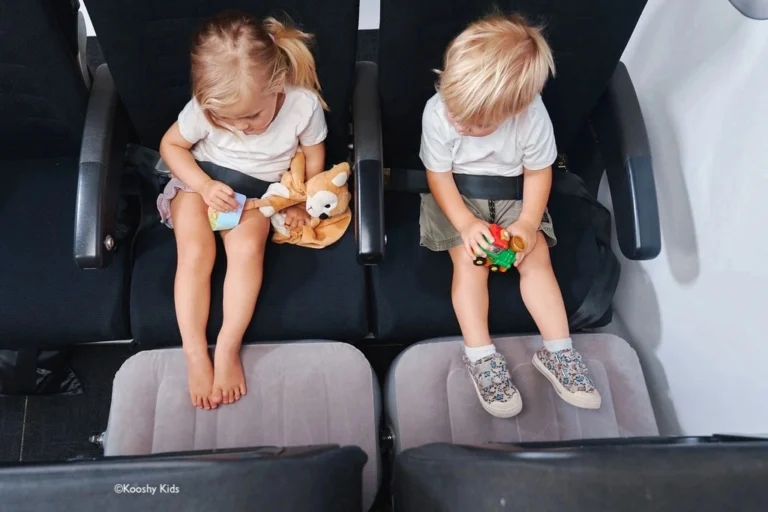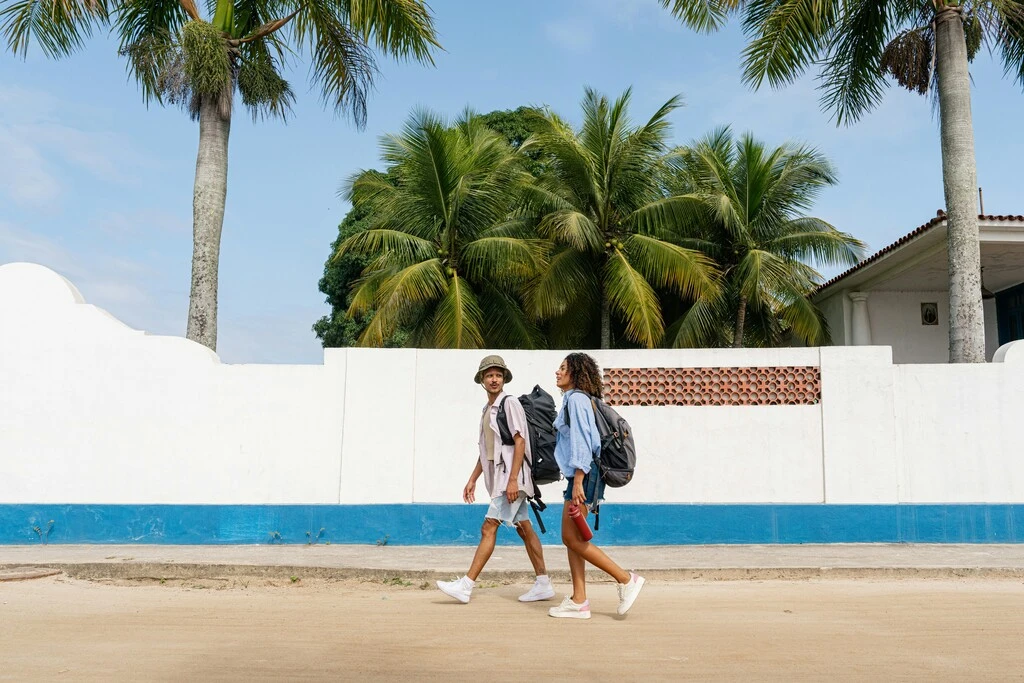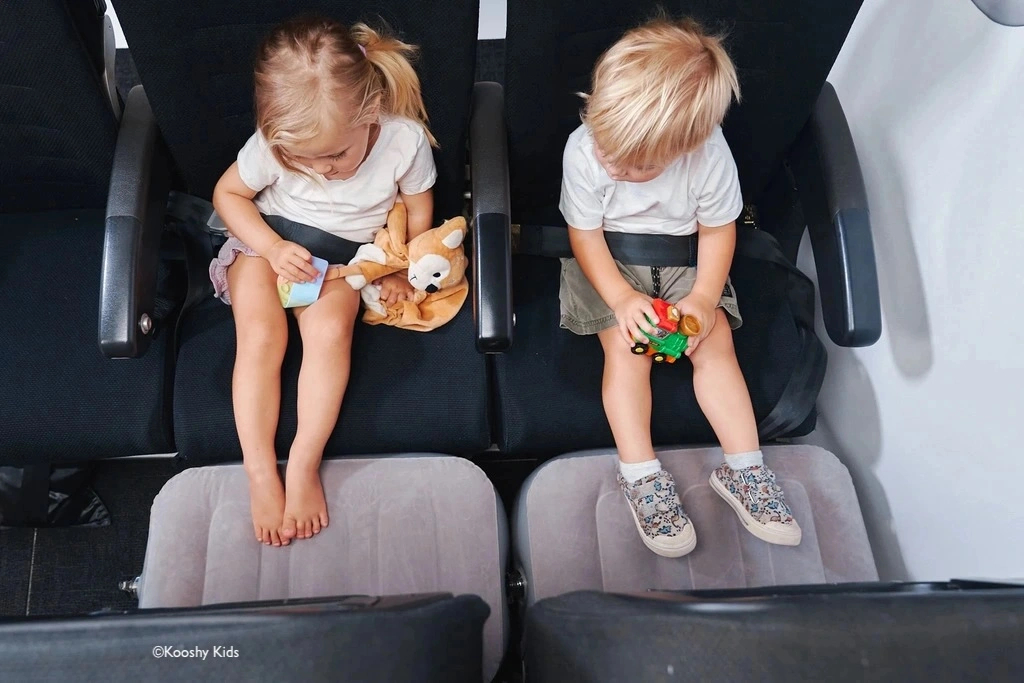Updated in January 2025!
Do you dream of a life filled with more adventures but don’t know where to start? Do you look at stories of full-time travel families on social media and wonder if that could be something for you? Then you are in the right place. Because I had exactly the same feelings and a lot of questions back when we were still trapped in our conventional life.
Let me tell you right off the bat: You can become a full-time traveling family! It’s not as difficult and unreachable as it seems. I promise!
We have been a digital nomad family since 2019, traveling with our two little girls to places like New Zealand, Southeast Asia, and Australia.
In this blog post, I will give you an in-depth look into full-time family travel. You will learn about the different types of long-term travel, how to prepare for this lifestyle, and what to expect. We will discuss income opportunities, schooling for the kids, and logistics. I will do everything I can to answer your questions. But if you still have any, let’s chat in the comments!
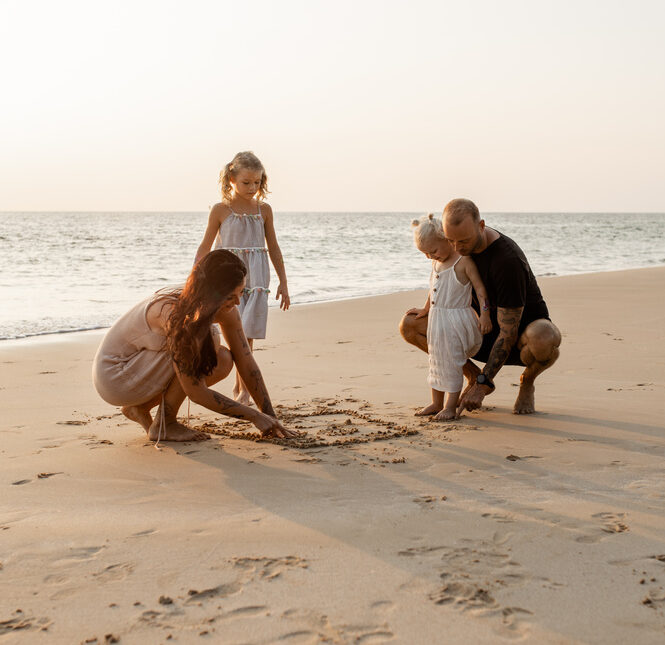
Why We Chose Full-Time Family Travel
Let’s travel back to 2017. That year, our first daughter Lila was born. Until then, my husband and I were employed full-time, spending 9-12 hours a day at the office. My husband was an art director at a large fashion startup, and I was a TV journalist, often on shoots. We were deeply entrenched in the “system,” as I like to call it. We had accumulated some debt from buying a car, had our trendy downtown apartment in Hamburg, Germany, and dutifully paid a large portion of our income in taxes to the state.
Don’t get me wrong, we were doing well. Technically speaking, at least. We had everything we needed. If one of us lost our jobs, the German state would step in and pay unemployment benefits. If someone got sick, the statutory health insurance would faithfully cover the bills. But as with investments, a lot of security comes with little room for the win, which equals personal growth. Our vacation days were very limited—still a luxury compared to countries like the USA—and we had little time for family and couldn’t make big financial moves.
I know that’s the reality for most people in the world and they are content with it (and there’s nothing wrong with that!), but for us, it just wasn’t enough. We wanted to see the world, experience adventures, break out of routines, and simply get more out of life.
The birth of our first daughter was a perfect opportunity because parents in Germany are entitled to 14 months of paid parental leave (yes, you heard that right, 14!). This gave my husband and me the chance to finally take a really long, adventurous trip as a family. So, we packed our VW T5 Bulli and drove from Hamburg to Morocco and back in three months.
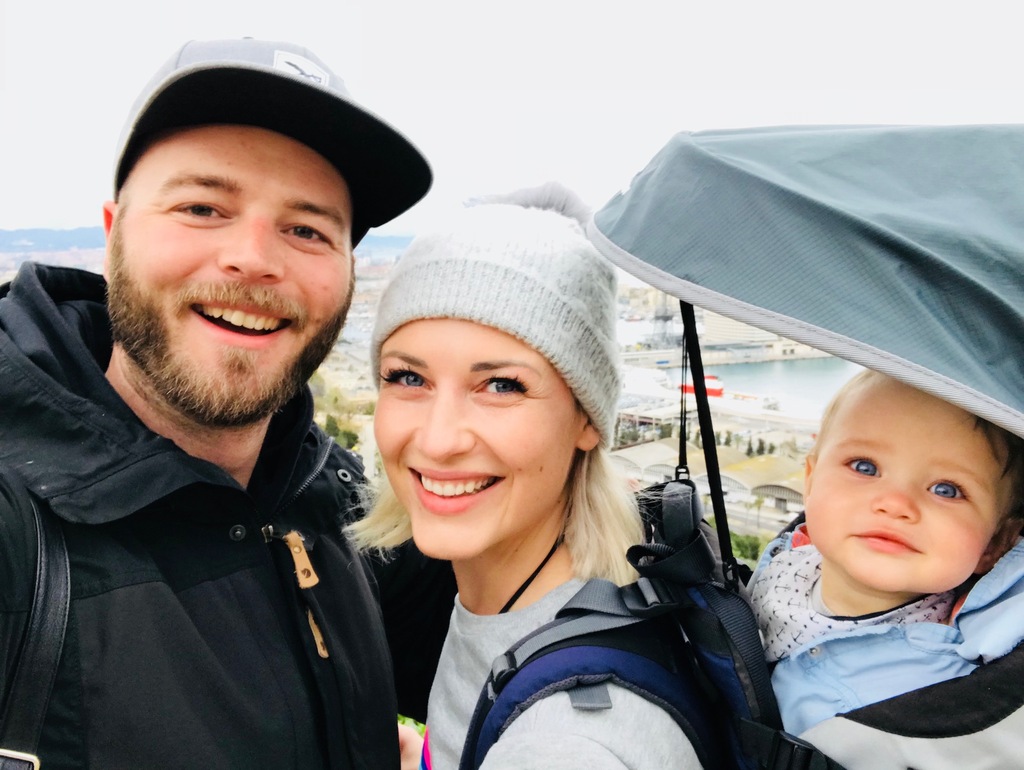
When we returned from this incredible adventure, we knew: We had to change our lives!
We couldn’t go back to our conventional life and pretend there was nothing out there we were missing. Fomo is real, guys! One evening, we sat down and covered the entire living room wall with Post-Its. Ideas like “Move abroad,” “Live in the Bulli,” “Spend six months a year in the South,” and “Become a Digital Nomad Family” were on the table.
After many days of weighing the options against each other, we finally decided on the last option: We wanted to become a full-time traveling family, give up everything, and make the world our home.
Two years later, in 2019, we stepped out of our comfort zone, sold everything, gave up our apartment and jobs, and flew to Thailand with a one-way ticket. Since then, we have been a digital nomad family and can’t imagine anything else.
Don’t get me wrong, it wasn’t all plain sailing and we had quite a few mental breakdowns, but the point is: the decision was the right one for our family!
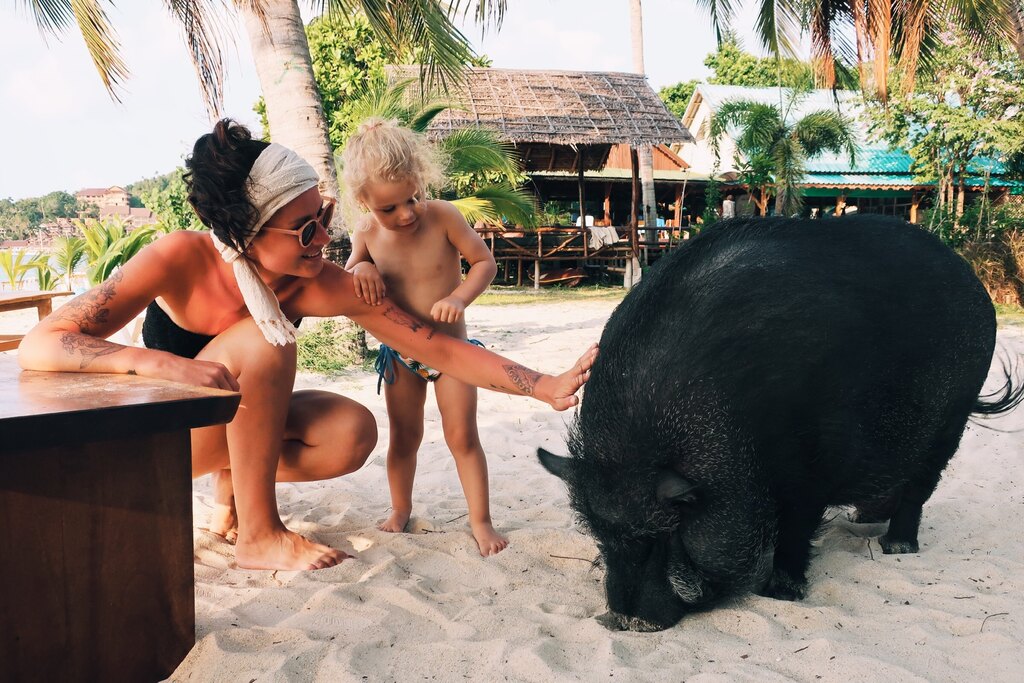
Benefits of Full-Time Family Travel
Okay, let’s start with the positive aspects that come with a full-time travel family life. Most of these are obvious:
Life is one Big Adventure
Depending on how fast you travel, as a full-time travel family there’s hardly any time to fall into boring routines and a mundane daily life. I’m not saying routines are bad (on the contrary, they can be lifesavers, especially with little kids), but doing the same thing every day gets monotonous in the long run.
As a full-time traveling family, you will constantly have to adapt to new environments and time zones, try new activities, discover different parts of the world, learn about different cultures, and adjust to new languages. While this can be a bit tiring, it is also incredibly exciting and beautiful.
Family Bonding on a New Level
In our conventional life, I spent about three waking hours a day with my husband. Now it’s much more. The same goes for the kids. There were days in our old life when my husband was still asleep when I took our daughter to kindergarten. When he came home late in the evening, she was already asleep again.
That doesn’t happen anymore. We all spend much more time together. And better yet: quality time! Not just stressed or irritated hours shopping or getting ready for bed, but relaxed dinners on the beach or spontaneous trips to waterfalls.
Your Relationship with your Partner Changes Drastically
Last year, when my husband went to Europe for almost three weeks and left me alone with the kids in Thailand, something interesting happened: I posted on Instagram that I was sad and would miss him. Suddenly, I got a storm of negative comments saying things like “Enjoy your time without him!”, “Don’t act like you can’t handle being alone!”, or “Stop whining and have a blast now that your annoying husband is away!”
Another group of followers encouraged me with comments like “I feel you!”, “Sending you strength for this time!”, or “Oh no, I hope the time passes quickly!”
Guess what, the group with the negative comments were exclusively people living a conventional 9-5 life. Those who supported me were exclusively people who also traveled full-time or were on long-term trips with their families.
What I’m trying to say is: When you are together with someone 24/7 and go through thick and thin with them, you have a different relationship than if you only see each other a few hours a day. You are not just romantic partners but also co-workers, joint travel planners, co-parents in the most challenging new situations, and often simply the only friend around.
So it’s a whole different story when that partner is gone for three weeks. Understandable, right?! I don’t want to judge which type of relationship is better or worse. I just want to show that the relationship will definitely change. In our case, it was definitely for the better!
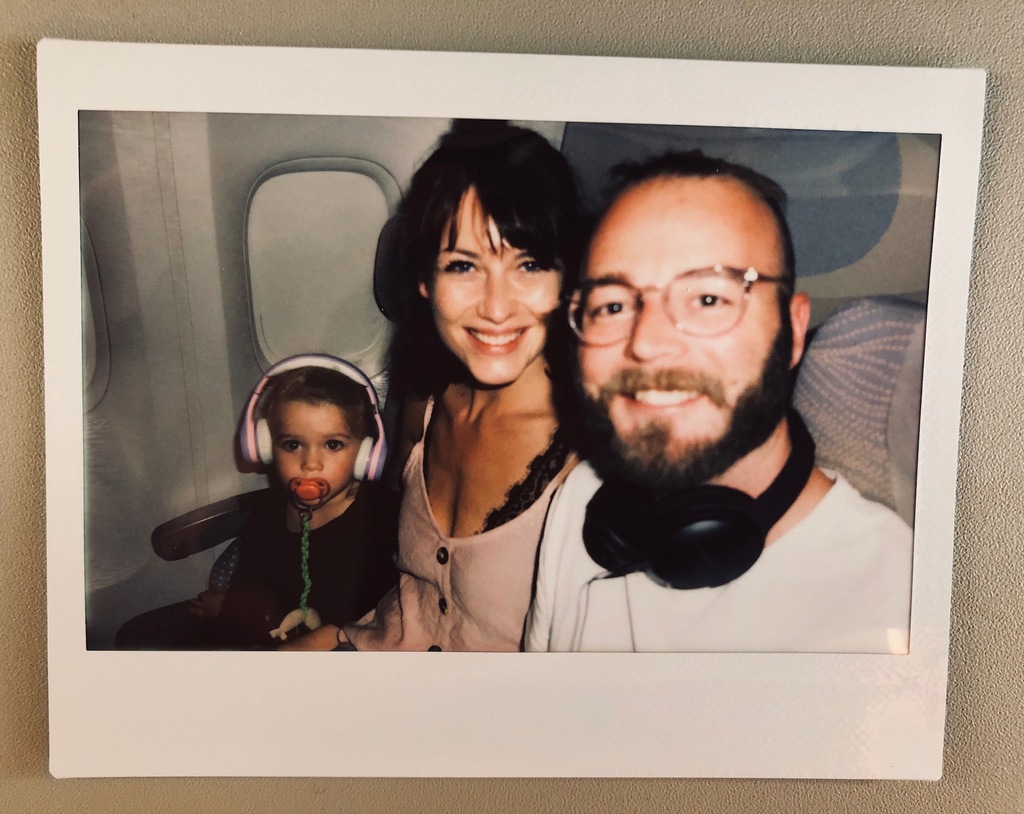
Endless Educational Opportunities for the Kids
While in conventional life, you are limited to the few schools in your residential area and, in many countries, even required to enroll your children there. As a full-time traveling family, the world is your oyster.
If you choose the traditional educational path for your kids, where they attend schools in person, you can choose your travel destination based on the school. Is there a great school in Bali? Then off you go! Your child wants to learn coding? Then your next destination is a school or project focused on that.
Moreover, there are countless other ways to educate your children, such as online tutoring, educational camps, homeschooling, or even unschooling.
Challenges of Full-Time Family Travel
Unfortunately, there are also many challenges that full-time travel families face. It’s clear, otherwise, everyone would be doing it. Here are the ones I personally find the most difficult:
High Travel Costs
Yes, you can do everything on a budget, but let’s be honest: Who wants to take a 14-hour train journey with two toddlers and then share one bed in a small bungalow? I know many families who do this and love it. But it’s not for me! We prefer to pay a bit more for a flight (or a more convenient travel route), a house with two rooms, and generally more comfort.
Because if I’ve learned one thing, it’s that nerves and energy are worth more than saving a few dollars. But that also means that traveling is quite costly for us and that we need a solid travel fund. Each move involves advance payments for a new rental property and new schools.
Additionally, in new places, you don’t know what’s good and often pay more than necessary (this still happens to us constantly with restaurants, nanny agencies, and scooter rentals).
No Grandparents Nearby
This is the biggest challenge, I think. Not only would life be much easier if we could drop the kids off at their grandparents’ for a few days, but we also constantly feel guilty.
By choosing to become digital nomads and leaving our home country, we take away the chance for our kids to bond with their grandparents, and vice versa. This is incredibly sad, and sometimes I have to hold back a tear when I watch our daughters video chatting with their grandparents.
But that’s part of the game, and at least we see our parents about once a year.
Loneliness is a Constant Companion
Are you the kind of person who lights up a room and makes friends with everyone immediately? Yes? Then congratulations! As a digital nomad, you will rarely be alone or feel lonely.
For the rest of us, who take longer to make connections, who often feel more introverted, and who are picky about new people, loneliness will be a frequent experience.
The problem is usually that just when you’ve built a small circle of friends and social contacts, it’s time to move to a new place. That’s hard. And as mentioned earlier, your partner is often your best and only friend.
I’m honest with you. Sometimes, I’m totally happy to be anonymous because it makes me more efficient. But sometimes, I’m just sad not to have a community of families around me to share my experiences with, and loneliness feels like one of the biggest challenges.
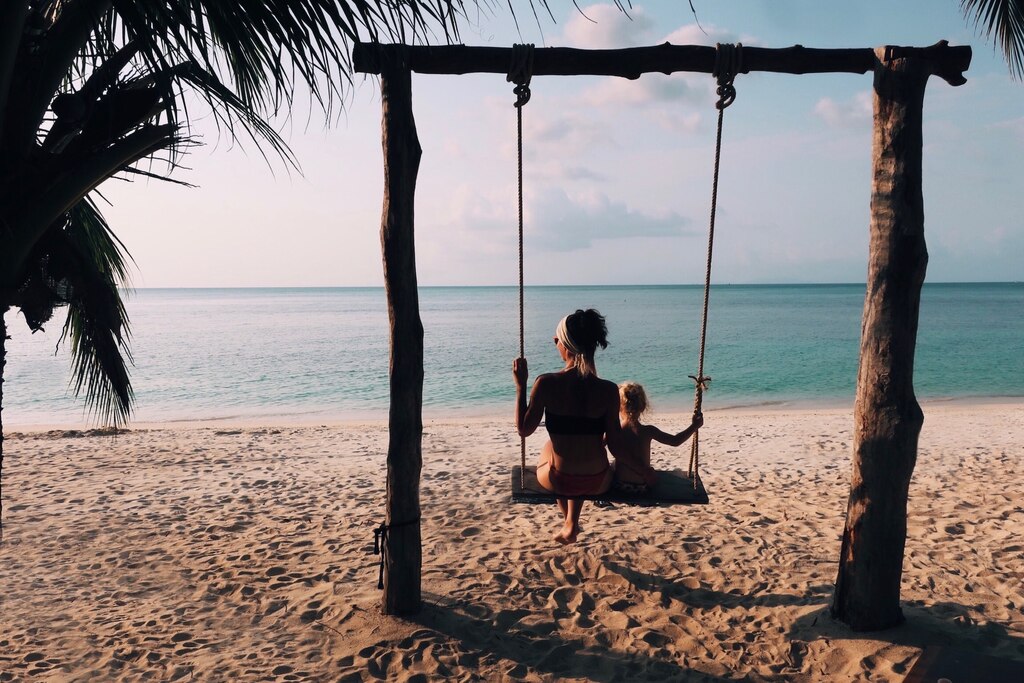
Becoming a Full-Time Traveling Family – Where Should You Start?
That all sounds great, Lulu, you might be thinking. But how do I even become a full-time traveling family? No problem, we’ll go through the topic step by step.
What kind of full-time traveling family do you want to be?
First, let’s clarify what full-time family travel means and explore the different types. Unlike what social media (and I, sorry) portray, you don’t have to sell everything and give up all your possessions. There are several other ways that aren’t so drastic.
Family Gap Year: In this case, you simply pause your conventional life, rent out your home, take a break from work, and travel. For this, you should have saved accordingly or have an income. A family gap year is an extended trip that can last from a few months to several years.
“Half-Time Full-Time” Travelers: Some families simply want to travel half of the year. They keep their home and, for example, live as a digital nomad family for only six months a year.
Then there are variants of full-time family travel that relate to travel speed and income sources:
Slowmads: These are digital nomads who travel particularly slowly. We definitely belong to this group because it suits our life with small children much better. Slowmads stay in one place for several months to a year (or even longer). They have much more time at each location, can sign long-term leases, enroll their children in local schools, and fully immerse themselves in a place and its culture.
FIRE (Financial Independence, Retire Early) Digital Nomads: These very smart and disciplined families have managed to become debt-free through targeted planning and save so much money that they no longer have to work. I have conducted an interview with Roksana, part of a FIRE Digital Nomad Family, which you can read here.
How do you want to earn money?
Ah, the money issue. Honestly, this is the most important topic in my opinion. Because believe me, without a reasonable, sustainable income, you shouldn’t even start traveling. Being financially secure is crucial—especially for families.
Financial security can have many faces. Whether you have remote full-time jobs, are freelancers with a good, constant client base, or run your own business. Whatever it is, it’s important that you have established your income streams before you set off. It’s challenging enough to work from the road (especially with small children who need to be entertained). I can’t imagine how it feels to have true existential fears or even have to return because the money suddenly runs out.
I generally recommend the three-month rule: You should leave with enough money to live comfortably for three months and afford return tickets on top of that.
Here, I have written an extensive blog article where you can learn how to make money while traveling: How to Make Money While Traveling around the World
And here you will find all the information about beginner remote work jobs: 20 Remote Work-From-Home Jobs With No Experience Needed
Where do you want to travel to?
Interestingly, even after many years as a digital nomad family, I still find this question one of the hardest. So much depends on this decision: Is it a safe place? Is the climate suitable for all family members? Is there enough infrastructure and schools? Will we be able to communicate with our language skills?
As a guideline, you can say: The first place you visit as a full-time traveling family should be a particularly easy and convenient place. A country where you have already been, where you can communicate, and that won’t make a big dent in your travel budget. After all, it’s supposed to be fun, right?
We chose Thailand back then. We love the country, the people, and their friendliness towards children. Life is affordable, and the infrastructure is sufficient for us. Fast forward to today, Thailand is still our home base and has somehow even become our new home.
But hey, the beauty of the nomadic life is, above all, the flexibility. Even if you don’t make the perfect choice initially, you can pack up again after a few weeks and move on. Nothing is impossible for us full-time traveling families, and moving is as normal as brushing our teeth. Okay, very strenuous teeth brushing.
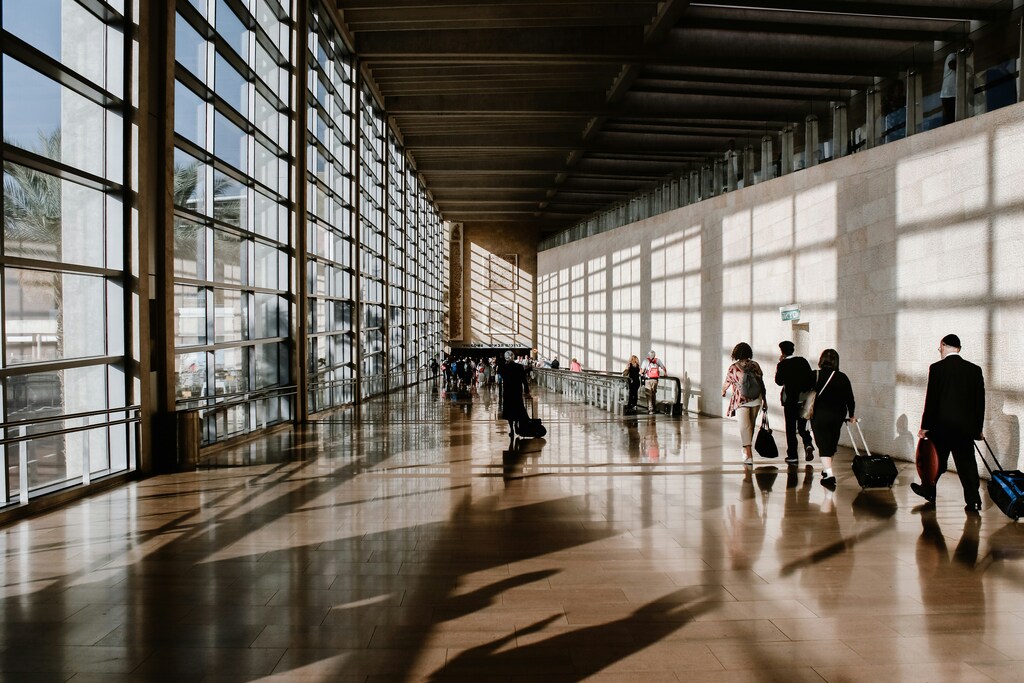
How will you be insured on the road?
I’m German. And you particularly notice that with topics like insurance. We Germans love to be insured against everything. Even though I have mostly let go of this mindset, I still hold on to one thing: health travel insurance! Sorry, but that’s an absolute must-have.
Because nothing is worse than not being able to cover the necessary costs when your child is sick, or your partner has had a serious accident. We have friends who didn’t have health insurance. When the father got seriously ill and was in intensive care at a private clinic in Bangkok, the big shock came. The costs were around 3,000 USD per day! Paying for a week of intensive care out of pocket is something I wouldn’t wish on anyone.
So, make sure you get good health insurance that at least covers emergencies before you leave. That will prevent you from hair loss and sleepless nights.
We chose the German travel health insurance provider “Hanse Merkur” back then. For us, as a whole family with two children, it costs about 200 USD a month. Except for vaccinations, it covered almost everything and was a very, very good deal. Unfortunately, Hanse Merkur did not extend our contract after the five-year period (maybe we just didn’t pay off?!), so we had to look for a new option.
Here, I have written about my process to find the best travel health insurance provider for our family.
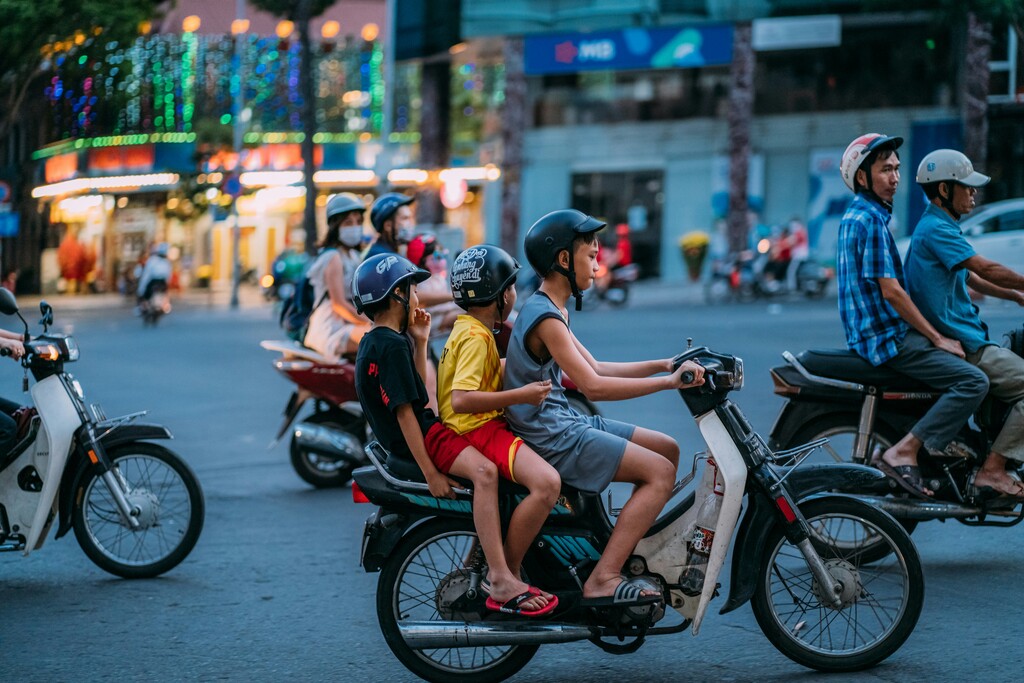
Packing and Preparation
If you have come this far with your considerations: Congratulations! Now, only a few practical steps are left to start your new life.
Decluttering and Selling Possessions
Depending on which path you choose, steps such as giving up your apartment and selling your possessions follow. You have to get rid of material things. You can sell items, give them away, donate them, or, as a last resort, store them with relatives or in a storage unit.
I found this part of the preparation very liberating. It’s impressive to realize how many material things you’ve accumulated over the years and how little you actually need them.
Standing in front of those expensive curtains you painstakingly researched and paid for, only to realize how unimportant and worthless they really are, can be very revealing. It’s not just the curtains themselves, but also the time, resources, and energy invested in acquiring them that come into sharp focus.
We have reluctantly become minimalists. What felt totally strange and unfamiliar at the beginning has now become part of our identity. And it will surely be the same for you! When I now enter a “normally inhabited” house, I feel totally overwhelmed. I think to myself, “Why do people need so much stuff? What do they do with all these things? It looks so overloaded! I just want to get out of here!”
To get many practical tips for living with less, check out my blog articles on the topic:
Become a Minimalist in 10 Easy Steps
Why Owning Less is Good for Your Mental Health

Essential Digital Nomad Travel Gear
Of course, some essentials come with the life of a digital nomad family. The most important things are those necessary to generate income.
This includes technical gadgets:
Laptop: Your main tool for work and communication.
Sleeve: Protection for your laptop during long term travel.
Charger: Keep your laptop powered up.
Optional: Stand, keyboard, and mouse for a more ergonomic setup.
Power Bank
External Hard Drive
Headphones
Smartphone
Optional Camera Gear, including Microphone and Tripod
Find the complete shopping list in my Amazon Storefront.
I have compiled an extensive packing list that also includes all the important documents in this article: The Ultimate Digital Nomad Packing List
Vaccinations
No matter how you feel about vaccinations, you should deal with the topic before you leave. What vaccinations do you need to enter certain countries? What other vaccinations make sense because certain diseases are widespread in your destination?
We started getting vaccinated against everything possible eight months before departure. That worked out well, so we were fully immunized and ready to go on time. This not only gave us a good, calm feeling but also helped us avoid complicated and expensive emergency vaccinations abroad (for example, against rabies after a dog bite).

On the Road: Daily Life as a Traveling Family
Routines and Flexibility
Especially as a full-time traveling family, you need routines and processes that make your life easier. For us, this means, for example, that when we arrive at a new place, we stock up on everything necessary on the first day. We move into our new house, rent scooters or a car, hire a new nanny, buy groceries, look for the nearest vegetarian-friendly restaurants and cafes, and check out sports facilities.
Travel days are very stressful, I know. But believe me, it makes total sense to settle all this on day one and then start day two in a somewhat regulated life.
Education
As mentioned earlier, we follow the traditional educational path for our two daughters. This means that wherever we are, they attend international schools on-site. This has the great advantage that they quickly make friends and can learn from different teachers. But also many disadvantages, such as constantly having to adapt to new school classes and being tied to public school holidays. The best schools are often booked out well in advance, so you have to put yourself on waiting lists early.
We will switch to online tutoring soon because it simply fits better with our lifestyle and travel style with young kids.
If you want to learn more about the different worldschooling methods, I highly recommend reading this interview I conducted with best-selling author Erin Riska: Eclectic Worldschooling with Tweens – An Interview with Erin Riska
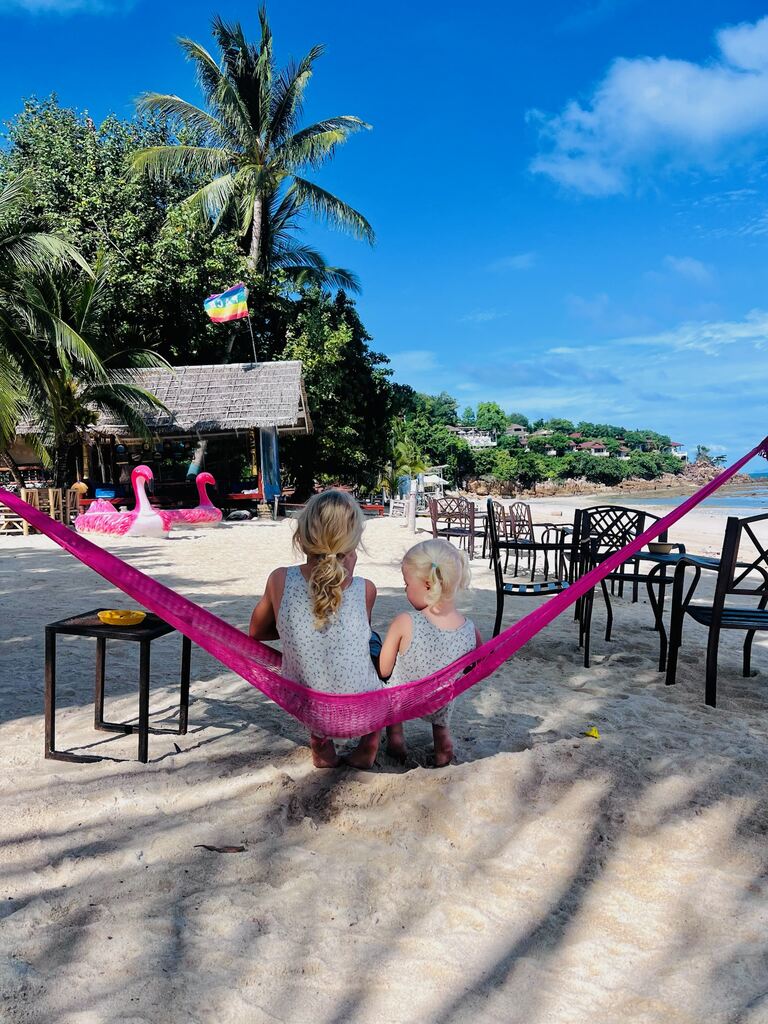
👉 You might also find these articles interesting:
– The Digital Nomad Parents Survival Guide
– Living in Thailand with Kids
– How to Travel Around The World and Make Money
– 20 Remote Work-From-Home Jobs With No Experience Needed
– Digital Nomad Taxes: All You Need to Know
Final Thoughts on Full-Time Family Travel
I hope that after reading this article, you’re well on your way to understanding what it takes to become a full-time traveling family. The journey from a conventional lifestyle to a life of constant adventure may seem daunting, but it’s more attainable than you might think.
Trust me, if we could do it, so can you!
Remember, the key to success lies in careful planning and preparation. Choose a travel style that suits your family, establish a stable income stream, and ensure you’re well-insured before setting off. Embrace the minimalist lifestyle and be ready for new adventures every day.
If you have any questions or need more detailed advice, let’s chat in the comments below. I’d love to hear about your aspirations and plans.
Thank you for reading and for making me part of your day! Yours, Lulu


